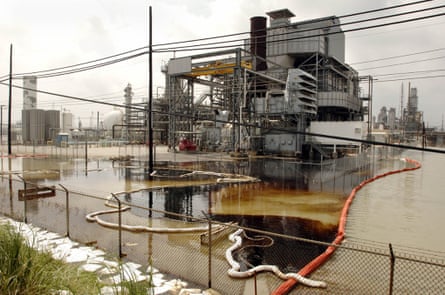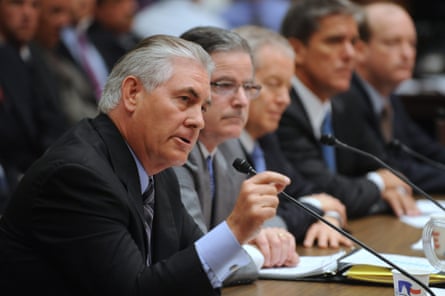Investors and nonprofits on Thursday asked the five largest US oil companies to disclose risks to their facilities from climate change.
In letters signed by Calvert Investments, Pax World Management, Walden Asset Management and other investors, as well as nonprofit advocates Ceres and the Union of Concerned Scientists, the groups express concern about “the lack of public disclosure of physical risks due to climate change”, such as from storms and flooding.
The letters are tied to a report, released by scientific advocacy group the Union of Concerned Scientists on Wednesday, that concluded that coastal refineries owned by each of the companies – Valero, Chevron, Exxon Mobil, Marathon Petroleum and Phillips 66 – are in danger of potentially costly disruptions due to rising sea levels and storms.
“To be clear, oil companies are going to suffer from climate change too, and they’re not doing enough to disclose that to investors,” said UCS’s Gretchen Goldman, lead analyst at the Center for Science and Democracy and the author of the report.
“Refineries have low profit margins and are situated on vulnerable coastal locations. Any disruptions in refining operations could have material impact on companies’ cash flows.”
The US has 120 oil and gas facilities within 10 ft of the high-tide line, Goldman said.
According to the report, which used storm surge modeling and geospatial data to map risks of flooding at coastal refineries in low-lying areas, Valero’s Meraux refinery in Louisiana faces the starkest physical risk among the refineries studied.
With forecasts that sea levels in the Gulf of Mexico could rise 3-4 ft (about 1 meter) by the end of the century, parts of the refinery are likely to be inundated by 2050, Goldman said.
That’s not even including the risk from storms. Storm surges from hurricanes already have reached as high as 28 ft (8.5 meters). “Even today, a category 3 storm could put the facility under water,” Goldman said.
The Meraux refinery, previously owned by Murphy Oil, suffered $330m in damages due to hurricane Katrina, noted Gabriel Thoumi, a senior sustainability analyst at Calvert Investments, which signed the letter to oil companies.

“For context, this is roughly the same amount of income Murphy reported a couple weeks ago for [the fourth quarter of 2014],” he said. “So if Murphy Oil, has a possible risk on its balanced sheet thats equivalent to its net income, we would like that risk to be disclosed. I think that’s fair.”
Oil companies have a plan
Companies had little to say in response to the report.
A Valero spokesperson told the Guardian that each of Valero’s Gulf coast refineries “has a detailed hurricane response plan that goes into effect in June of each year and progresses as storms approach. Valero’s refineries have excellent safety and reliability records.”
A Chevron spokesperson said that the company recognized concerns related to climate change: “We disclose information about our efforts to address climate change risks and incorporate these risks into our business planning activities.”
The other companies didn’t respond to requests for comment by press time.
Oil companies may well be thinking about these risks, but – in their SEC filings anyway – they aren’t talking about them with their shareholders, Goldman said.
“If they are thinking about it and they are acting on it, why not tell your shareholders and your investors that they are protecting these assets?” she said.
Of course, it’s difficult to discuss protecting assets from climate change without talking about climate change. And even though public rhetoric has changed, oil companies have funded climate-change denial for decades: news came out last week that a prominent climate denier received $1.25m from oil companies over 14 years.

Climate change’s bottom line
This isn’t the first time NGOs and activist investors have tried to put a dollar amount on oil companies’ climate change risks.
Economists, researchers and others have warned that oil companies’ assets may end up being overvalued, if global climate talks limit emissions, which could put investors at significant financial risk. (A study published in the Nature journal in January concluded, along with previous research, that some 80% of fossil fuel reserves must be left in the ground if global temperature rise is to be kept under the agreed-upon goal of 2C.)
Under pressure from investors, Exxon Mobil in March agreed to report on the risks of its assets being “stranded”, or unburnable, because of potential climate regulations. But in its report in April, the company wrote that it doesn’t expect any of its fossil fuel reserves will be stranded. Meanwhile, in a shareholder letter in May, Shell said it doesn’t believe any of its proven reserves will become stranded either.
Rising shareholder interest in assessing the impact of climate change on business has attracted the attention of corporate boards: the BP board earlier this month endorsed a shareholder proposal asking for more disclosure about climate risk, after the Shell board endorsed a similar proposal in January.
But the latest initiative is different because it asks companies to evaluate the potential financial impact of physical risks from climate change, such as flood damage to their refineries, instead of the political risks.

‘We could incur increased expenses’
The moves comes after the US Securities and Exchange Commission in 2010 issued guidance suggesting that companies disclose climate change-related risks that might affect their bottom lines. But oil companies have largely ignored this guidance, which isn’t legally required.
Of the companies studied in the report, only Phillips 66 has disclosed any physical climate risks in SEC filings, according to the report, which calls the Texas-based company’s disclosures “poor”.
In its 2014 filing, Phillips 66 stated: “To the extent there are significant changes in the Earth’s climate, such as more severe or frequent weather conditions in the markets we serve or the areas where our assets reside, we could incur increased expenses, our operations could be materially impacted and demand for our products could fall.”
And in its most recent earnings statement, filed last week, the company said climate change posed a serious potential risk to its business.
Will companies act?
None of the companies provided information on how they will prepare for these risks.
“Really in the end, the industry is damned if it does and damned if it doesn’t when it comes to climate change,” says Andrew Logan, director of sustainability advocate nonprofit Ceres’ carbon asset risk program. “If oil companies continue along the business-as-usual path, they’ll either be hit by demand risk and the rise of clean energy, or by the massive physical impact of climate change, or perhaps both.”
Goldman’s report recommends that the SEC push companies to follow its guidelines for disclosing climate change risks.
An SEC spokesperson said the guidelines aren’t mandatory and aren’t actively enforced by the SEC: “companies can use the guidance to assess their own facts and circumstances on this issue and provide disclosure to the extent material to investors”.

Comments (…)
Sign in or create your Guardian account to join the discussion